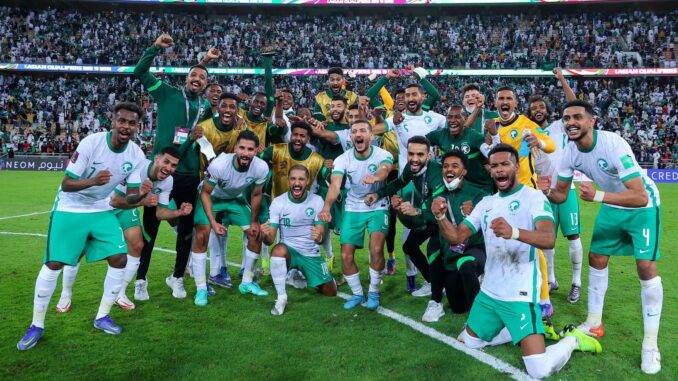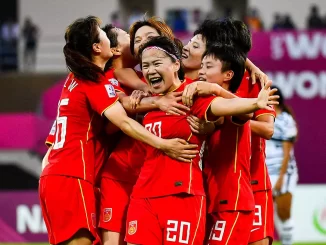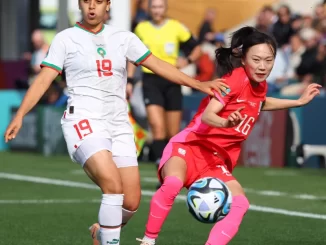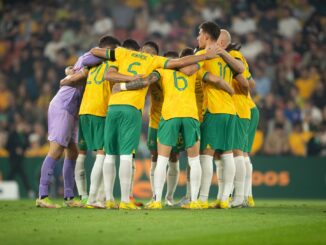
Almost four years on from their infamous 5-0 defeat to Russia that opened the World Cup in 2018, Saudi Arabia have booked their return to the global showpiece, after their peerless qualification was sealed on Thursday.
Following their absence on the global stage of 12 years, Saudi Arabia’s immediate return following such heartbreak in Russia is highly admirable. Especially so given the manner of their qualification which was nothing short of dominant, clinched with two games to spare, above Asian heavyweights Australia for a second time in succession.
Their qualification campaign has been a story of evolution rather than revolution; a journey that started on the final whistle in Moscow, some four years ago
Despite what will be defined by that opening day demolition, Saudi Arabia went on to prove their level at the last World Cup, competing well with Uruguay and Egypt in the remaining group stage matches, yet it was apparent this was a team mid-transition.
Unlike many across the continent, the Saudi Arabian Football Federation’s patience following their exit should receive some plaudits.
The then under-fire coach Juan Antonio Pizzi, a man directed to instil his clear possession-based ideology that struck hard against the typical Saudi Arabian football philosophy on arrival, was kept on to continue his work in the aftermath of Russia. While he ultimately paid the price for failing to achieve the necessary results at the following Asian Cup, his stamp on the squad remains to this day.
His replacement, arguably the best coach outside Europe, Herve Renard, joined following his own qualification for the World Cup in charge of Morocco. His presence on the national team, which has grown over the last four years, has since honed a style and identity that modern Saudi Arabian football has come to represent.
Moulding the old with the new; the more direct, physical, wily football that has defined Saudi club football for decades, a style so successfully embraced by Bert van Marwijk in 2017, alongside Pizzi’s progressive, possession-based mentality, Renard has formed a team that can play both ways – either through you or against you; demonstrated by a mix of flying, eye-catching victories and hard-fought battles throughout qualification.
While Saudi Arabia currently sit clear in second with one match to play, the story of their qualification phase was far from a smooth ride, especially in their early days under Renard. Dropped points against Yemen and Palestine in their first three games caused concern, as did trailing to Uzbekistan with five minutes to go in their fourth matchday.
That last five minutes in Tashkent proved how Renard sought to be different to his predecessors; handling the pressure immensely and dictating the mood, their ultimate ability to provide moments of quality came to fore, scoring twice to tip the group in their favour.
Emerging from a year’s break for COVID, which benefitted rather than hindered Renard’s progress, the other more free flowing side of this team started to shine through in a devastating fortnight in June last year. Winning all four of their remaining matches, scoring 14 without conceding a goal, Saudi Arabia strolled on to progress to the latter stages of qualification.
While the Second Round had its drama, and something resembling a redemption narrative, this Third Round has been surprisingly well managed. Effective when they needed to be, let off the leash when required, the game management of Renard came into its own.
While their competitors continued to slip in matches around them, the Green Falcons were imperiously effective, even in the matches where they lacked a solid run of form. Drawing 0-0 in Australia in January proved the defining point of their progress, at that very moment easing themselves into the big leagues in Asian international football.
The mentality of the squad has long been their key strength, but the quality in possession has been something that has needed to develop over time.
An evolution of Pizzi’s sometimes risk hungry, possession for possession’s sake mentality, Renard has clung to a more comfortable game management feel; no strict philosophy, in essence playing the right balls at the right time. Simple in its message, highly difficult in its execution.
The benefit of timing for Renard has been the coming of age of the young cohort of players that were continental champions at U20 level in 2018. The technical quality of Sami Al-Najaei and Abdullellah Al-Malki in central midfield has quietly kept this team ticking along in the middle of the park, while Abdulrahman Ghareeb and Khalid Al-Ghannam have provided glimpses of what an effective, more direct attacking ability this side has from out wide.
In defence, they have developed from a broadly rigid and arguably one-dimensional deep block, to a number of comfortable-in-possession, modern day centre backs. Al-Nassr duo Abdulelah Al-Amiri and Abdullah Madu, alongside Al-Hilal’s Ali Al-Bulahi, have all pushed the mantle forward with their ability to defend effectively first whilst remaining critical to attacking build up play, a growing hallmark of Renard’s flexible game plan.
It’s no wonder that the absence of Hassan Tambakti, arguably the most competent defender for the coming generation, hasn’t been obvious during these latter rounds of qualification. Saudi Arabia mounted up five clean sheets from nine games without him, underlying the strong foundations upon which this team is built.
Albeit there remains concerns higher up the pitch, as Renard continues to struggle in putting his finger on his preferred starting striker.
Listen to our interview with Herve Renard from August 2021:
Saleh Al-Shehri has threatened in spells, but came up too inconsistent over longer periods, while Firas Al-Buraikan, arguably the most competent finisher in Saudi football at present, remains a weak lone forward option, especially from the start, instead growingly effective when offered time and space from the bench.
With a number of options including Abdullah Al-Hamdan set to star at this summer’s U23 AFC Asian Cup, if there’s one position that a bolter from the pack can pounce to seize, it’s that of centre forward.
The other question mark surrounds experience: how much further forward is this squad than four years ago?
Ahead of Russia, the brief and ultimately fruitless effort of sending talent to Europe at a range of substitute benches across La Liga failed to muster the results desired. Four years later, not one player has made inroads into European football again, creating somewhat of a bottleneck domestically amongst a growing crowd of foreign talent in the Saudi Pro League.
This crowded market place is something Renard is all too acutely aware: “There are many foreign players in each club in the league, which makes my job a bit more difficult.”
With less than nine months left until the World Cup, he’ll hope his squad continue to accrue worthwhile minutes.
The likes of Salem Al-Dawsari, Fahad Al-Muwallad and Salman Al-Faraj remain the difference makers, who to their credit regularly stand up to the mark when required, but that lack of high-level experience could be a decisive mitigating factor once the World Cup rolls around, as all three experienced at different times at the Olympics and Club World Cup over the last twelve months.
To sign off a celebration of their World Cup qualification on a negative note, however, would be highly unjust. Following a near faultless four-year cycle, that only South Korea have matched in terms of consistency, Renard deserves widespread praise.
The adaption of old and new styles, into his very own vision of the Saudi national team, alongside individual playing quality that is about to hit their peak, the realisation of years of work looks set to pay off.
Saudi Arabia ironically have become the mirror image of what they always fought against if you go back five or ten years; a team of patience, consistency and above all effectiveness.
Photo: twitter/SaudiNT




